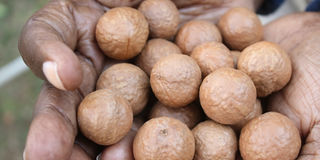Making the global demand for macadamia work for Kenyan farmers
Sponsored by Kakuzi PLC

Kenya's Agriculture and Food Authority (AFA) has reinforced a ban on the export and transit of all raw macadamia nuts, regardless of origin, through its ports and border points.
By Mathias Muinde
For years, growing macadamia nuts in Kenya seemed like a hobby for wealthier, more sophisticated farmers. Only a few could indulge in it.
The traditional farmer focused on crops like tea and coffee for their supposed high demand and better returns. It remained so for a long time.
Lately, however, the farming community has been embracing macadamia. It is becoming the new ‘green gold’.
In Nakuru County, for instance, where smallholder farmers were mostly known for producing potatoes and tomatoes, more and more of them have taken to producing this nut. The growing interest in the crop has seen several county governments incorporating it in their crop diversification programmes. Nakuru County Government recently distributed 12,000 macadamia seedlings to more than 600 farmers.
This comes against a backdrop of increasing global demand for nut-based diets, with macadamia being considered as queen of the nuts. This is driven by changing consumption patterns in Europe, including a rising demand for healthier snacking options and vegetable protein. Consumers are also seeking new consumption experiences, which macadamia nuts can offer in the form of milk, pastes and butters, in addition to its traditional consumption formats.
Macadamia nuts provide a viable option to other snacks like peanuts and cashew nuts. It is increasingly an ingredient for cookies, cereal and protein bars, fruit and nut bars, ice cream toppings, and chocolate. These are especially great choices for the growing vegan community.
Currently, Germany is Europe’s largest importer of Kenyan-grown macadamia, which accounts for 38 percent of the country’s macadamia imports from Africa. A 2019 report by Kenya’s Ministry of Foreign Affairs estimated that macadamia worth $87.2 million was exported to Germany in 2018. With Kenya currently ranked as one of the larger producers in the world, the crop has a significant role as a foreign exchange earner.
In Australia, the US and Japan, macadamia is in demand as an ingredient for manufacturing various products, especially ice cream. In other countries, it is consumed as a salted snack. Such multiple uses have increased the value of the n, since some European countries export it after processing and repackaging it into different products.
The big interest notwithstanding, a number of challenges still affect the crop’s value chain, reducing volumes exported from Kenya. These include low-quality nuts, insufficient stakeholder management and poor market access.
The poor quality of nuts arises from the tendency by some farmers to harvest the crop before they mature, as well as inadequate pest management during critical growing periods. Unfortunately, these defects are only noticed during processing when the shell is first cracked. By this time, it’s too late to identify which farmer the product came from.
The uncertainty about the quality of the nuts leads processing factories to be cautious about the price they pay the farmer, or they risk losing money. Ultimately this doesn’t help anyone. Making money from any crop starts with growing it properly and having resources to teach farmers how to do this.
Brokers, independent buyers and suppliers often influence farmers’ decisions to harvest and sell low quality products. Processing plants and regulatory bodies need to hire more extension officers to visit smallholders and adequately address their issues, while training and advising them on producing quality, traceable products.
Lack of communication amongst macadamia stakeholders also affect the crop’s value. This disconnect between smallholder farmers, processing plants, regulatory boards and exporters, complicates all players’ ability to fully benefit from the product.
It is incumbent upon the Agriculture and Food Authority in Kenya (AFA), in collaboration with the Nuts and Oil Crops Directorate (NOCD), to find ways to incorporate all stakeholders when making policies affecting farming, processing and export of this product. Consistent dialogue and transparency will go a long way in improving the value of macadamia.
Then, there is the challenge of access to markets. When a bad reputation is built over time regarding quality of nuts and traceability, penetration of new market becomes a challenge.
Importers in some markets distance themselves from Kenyan nuts as they fear we cannot provide the traceability credentials they demand. It’s all about field to fork, and if you can’t trace that, your markets become limited. To address this, it is important to set up solid smallholder groups who are accredited with internationally recognised standards.
After highlighting great demand for macadamia, the increasing market scope and the various challenges and how to get maximum value, I think it is now safe to say crop diversification into this product is necessary.
The value and economic empowerment that can come from this product is immense, but there is a danger in just encouraging farmers to plant a crop without explaining what they need to do to get the best value. Farmers must be further empowered to make choices as to which market they want to aim for. Remember that growing crops properly also has higher costs, so partnerships with cracking factories are crucial.
Finally, by engaging in an open dialogue with all the stakeholders, we can ensure that everyone understands the challenges and opportunities of this crop. This way, there is no disconnect between farmers and the exported end product. If all stakeholders play their roles right, agriculture might just again become the pride of our nation.
The writer is the Assistant General Manager, Macadamia Division, Kakuzi PLC


